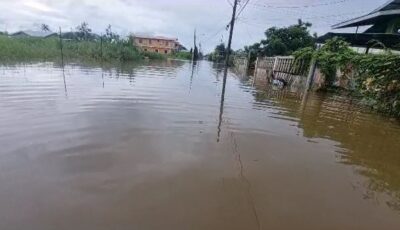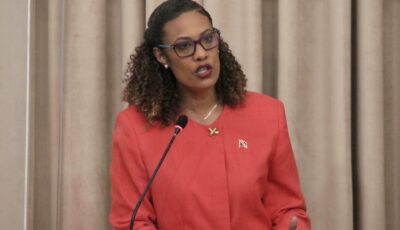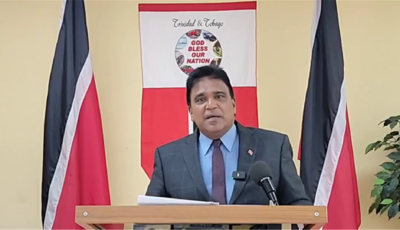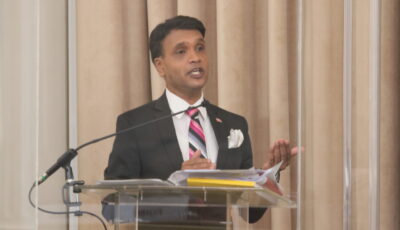HEADLINES
Commentary
Rowley strenuously objected to the construction of Penal-Debe UWI Campus
The media is reporting that the UWI Penal-Debe Campus, built during the People’s Partnership Administration continues to sit empty and has never
Posted On 30 Oct 2023
Blighted WGTL Project continues to haunt PNM
That World Gas-to-Liquids project is another of the many PNM scandals and failed projects which has cost taxpayers billions of dollars! And it is
Posted On 22 Jun 2023
Who financing Balisier House?
Ferdinand Ferreira, a founding member of the People’s National Movement (PNM), is quoted in the media as saying that the party has always
Posted On 03 Apr 2023
UNC SENATORS DEFENDED THE PARTY WELL TODAY
Today, the Opposition UNC Senators defended themselves and the Party well from the frivolous, anti-democratic motion by Senator Anthony Viera.
Posted On 22 Feb 2022
COVID WORKERS FIGHTING A WAR WITHOUT THEIR PROPER WEAPONS
We congratulate Kamla Persad-Bissessar on her success in forcing the Government to conduct an inquiry into the handling of covid. We take this
Posted On 20 Feb 2022
Letters
For fools rush in where angels fear to tread
The National Security Minister’s recent unrestrained language and conduct towards judges and unjustified criticisms of their judicial functions
Posted On 14 May 2023
Seek a fresh mandate
I recently read in one of the daily newspapers that Minister of National Security Fitzgerald Hinds said that 70% of society wants to see him
Posted On 27 Dec 2022
Don’t Blame God for Rowley’s Dotishness
Prime Minister Keith Rowley at the PNM convention on December 4, 2022, announces a National Day of Prayer. He said the country must come together
Posted On 16 Dec 2022
Keith Rowley has betrayed the sanctity of Parliament
Dear Editor, The revelation by the Commissioner of Police that the emails which Keith Rowley, then Opposition Leader read in our nations
Posted On 19 Jul 2019
T&T owes Kamla a debt of gratitude
Kamla Persad-Bissessar did what many were not expecting… she and her MPs voted unanimously with the Government to ensure passage of the Civil
Posted On 09 Apr 2019
Press Releases
Tancoo: Flooding imminent as Government fails to act
After a couple days of scattered “April showers” earlier this week, MP for Oropouche West, Dave Tancoo is again warning that severe flooding in
Posted On 06 Apr 2024
MP Khadijah Ameen wants justice for Kiss Driver’s death
Member of Parliament for St. Augustine, Ms. Khadijah Ameen is calling for justice for the death of Kiss delivery driver, Neil Ballai. Ballai was
Posted On 06 Apr 2024
UNC’s Persistent Pressure Forces Rowley Gov’t to Release 2024 EBC Report
On the heels of intense, consistent pressure from the UNC over their highly questionable refusal to lay the 2024 EBC Boundaries Report in
Posted On 06 Apr 2024
Moonilal: Hinds Fails Fire Service, Lives at Risk as Equipment Crumbles
The collapse of the Trinidad and Tobago Fire Services is another crushing indictment on the spectacularly failed Fitzgerald Hinds as Minister of
Posted On 05 Apr 2024
Padarath: Gov’t Electricity Rate Hike “Unbearable Burden”
Princes Town MP, Barry Padarath said that the contents of a report in yesterday’s Business Guardian headlined “RIC Recommends
Posted On 05 Apr 2024
Speeches
Tancoo: calls on Imbert to have a heart and indemnify the population
Today we come to you to shine some light on a very worrying development that has happened in the past few days. I am sure many of you saw or
Posted On 08 Sep 2021
Rowley’s Mad Power Grab in Tobago
My friends, we are seeing a government that is in freefall – in every single sector. Health, National Security, the business sector. And what
Posted On 16 Feb 2021
Presentation of UNC general election candidates 2020
T&T family! UNC family! It is my absolute pleasure to speak with you today, as we get ready for the sweeping victory that is to come on
Posted On 19 Jul 2020
Kamla: My vision is to build an intelligent nation
“ON THE BALLOT” UNC VIRTUAL MEETING (June 25, 2020) Introduction Good evening and thank you for joining us once again as we continue to set the
Posted On 26 Jun 2020
MNF – Kamla: There is hope
Introduction Good evening T&T! Good evening UNC family! It is good to be back! 2020 we are ready to rumble! Are you ready? Even though it’s
Posted On 11 Mar 2020
Copyright © - 2023 United National Congress







The Moving Train
Kevin Ramnarine.
By Kevin Ramnarine
Last week the Prime Minister (PM) visited Houston and met with BP, Shell and others. Following the meeting his office announced that BP was planning to invest US$ 5 billion in T&T in the next five years.
This is nothing new, comes as no surprise and is the continuation of an investment trend that started in 2012.
In fact, in the last five years (2012 to 2016), BP invested US$ 5.5 billion in T&T. BP’s plans to invest US$ 5 billion in the next five years is therefore not earth shattering news to anyone who remotely follows the energy sector in T&T.
It was also surprising to see that there were some who believed that the PM went to Houston, waved a magic wand and BP decided to invest US$ 5 billion here. The international oil and gas business does not operate like that.
BP’s heightened level of capital expenditure (capex) in this country started in 2012. In that year, they conducted the first phase of the Ocean Bottom Cable (OBC) seismic survey and drilled the Savonette 4 well which survived sabotage and went on to find one trillion cubic feet of natural gas.
BP went from having no rigs drilling in 2010 to having three rigs drilling in 2015. In 2017 the company is drilling two exploration wells (Savannah and Macadamia) after an 11-year hiatus from exploration drilling.
It’s also preparing for first gas from Juniper and TROC. These things don’t fall from the sky.
In October 2013 when he visited T&T, the BP Chief Executive Office Bob Dudley remarked that because of changes to the fiscal regime we would see increased investments in exploration and development.
This means that the BP investment train was well in motion.
What caused the change in BP’s view of T&T? Firstly, we understood that the fiscal regime had to become more competitive to attract investment and we delivered on the reform by way of legislation.
Secondly, we understood that the relationship between BP and the Government was the most important relationship in the country.
When I was Minister, it was a relationship based on mutual respect and collaboration. One can only assume that this has continued and no one has since “boofed up” BP. One can only hope.
With regard to the fiscal regime that governs our oil and gas business, in the last 20 months, the Rowley administration has made no changes.
It follows therefore that investment decisions that are being made are done so in relation to the fiscal regime that was in place in September 2015. In Government talk is cheap and action is a premium.
We also heard that the NGC / BP negotiations for a new contract had advanced and were nearing finalization. This new contract is needed for the sanction by BP of the Angelin project. This should have all been completed in late 2016. It’s now April 2017 and this is late.
We also heard nothing about whether the BP Angelin platform would be constructed in La Brea.
If it turns out that BP decides to construct this platform in the USA, we should not be surprised. On a personal level, I’d love to see that platform built in La Brea but one can understand if BP decides to build it in Texas or Louisiana. The just concluded BP Juniper project suffered no end of industrial relations headaches, protests and disruptions. The OWTU made no secret of their involvement in these events. The net result is the sacrifice of the national interest for narrow sectoral interest.
The relationship between BP and the Government is the most important economic relationship in the country. BP and the NGC are the largest contributors to the treasury.
BP is the country’s largest investor and the largest producer of natural gas. On the other hand, Trinidad and Tobago is important to BP as it accounts for 17% of BP’s global production volume.
Both T&T and BP are locked in a symbiotic dance. This is a relationship that has to be managed. The BP investment train has been moving at high speeds in T&T since 2012. It’s good to see it will stay that way for years to come.
It is noteworthy too that the Prime Minister was unaccompanied by the public servants of the Ministry of Energy and officers of the relevant State companies. Why weren’t the senior public servants of the Ministry of Energy part of the delegation? Why wasn’t the NGC taken along?
The Prime Minster of Trinidad and Tobago ought not to be discussing business such as the forward drilling plan for EOG Resources without the public servants of the Ministry of Energy being in the room. And what of the NGC? Is business being transacted on behalf of the NGC by the Prime Minister? If so what is the role of the Board of the NGC?
Is the Ministry of Energy is being side-lined? In all my international travels to conduct the business of the country, I was accompanied by senior public servants, advisers and officers of the relevant State companies.
This trip has caused more questions than answers and the fact that it coincided with the Shell Houston Open golf tournament generates even more speculation.
Kevin Ramnarine is a former Minister of Energy of Trinidad and Tobago
Share this:
Like this:
Correcting the record on natural gas curtailments
WHY WE LOST ANGELIN
Commentary
Rowley strenuously objected to the construction of Penal-Debe UWI Campus
Blighted WGTL Project continues to haunt PNM
Who financing Balisier House?
UNC SENATORS DEFENDED THE PARTY WELL TODAY
COVID WORKERS FIGHTING A WAR WITHOUT THEIR PROPER WEAPONS